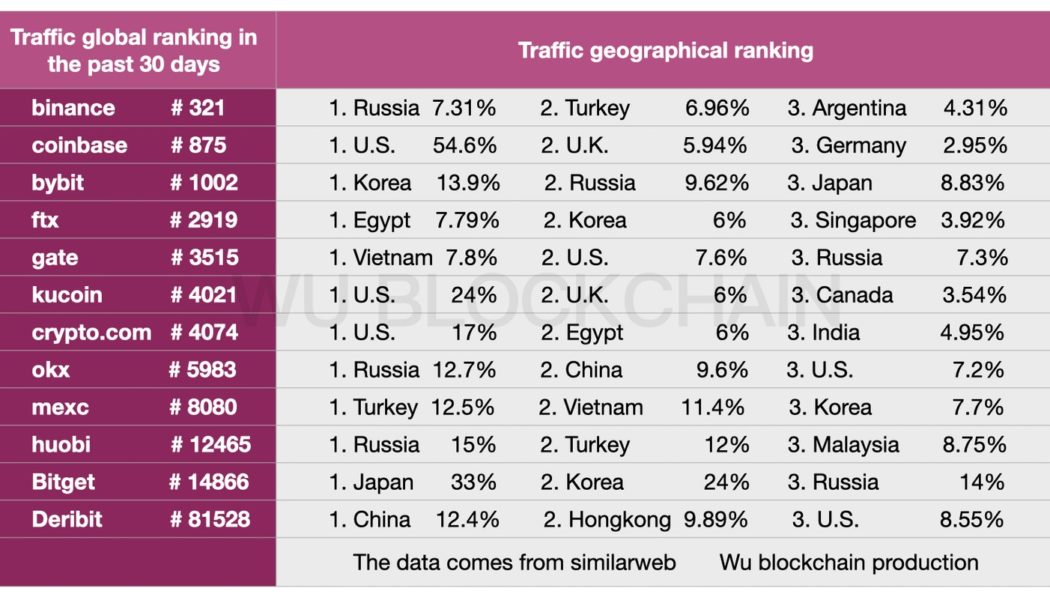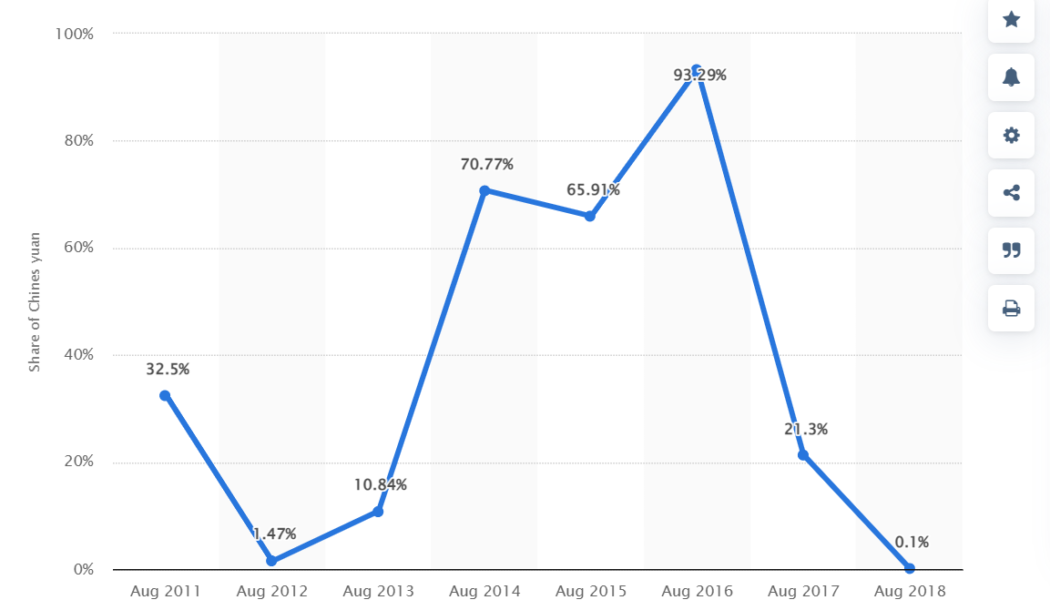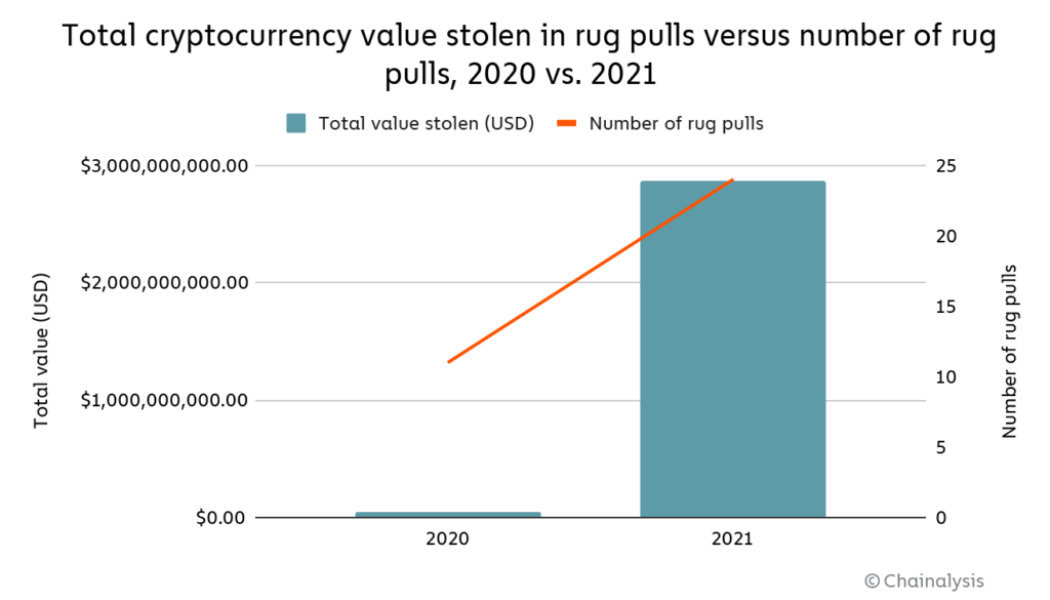Peoples Bank of China
China accounts for 84% of all blockchain patent applications, but there’s a catch
China accounts for 84% of all blockchain applications filed worldwide, according to the latest data shared by the country’s government official. China has steered clear of the cryptocurrency market. However, the Beijing government has been supportive of the underlying blockchain technology. The country has actively promoted the use of blockchain tech over the years, and thus the high percentage of blockchain patents isn’t surprising. President Xi Jinping has also played a key role in promoting the nascent blockchain technology. In 2019, the President called upon citizens, tech companies and stakeholders of the ecosystem to actively participate and innovate with the nascent tech as it would play a key role in the future of the next industrial revolution. As Cointelegraph reported earlier, C...
Deribit and OKX attract significant traffic from China despite a blanket ban: Report
Data from website traffic metric provider Similarweb shows that Deribit and OKX continue to attract significant traffic sources from China despite a blanket ban on crypto transactions and foreign exchanges last year. China has banned the use of cryptocurrencies more than a dozen times in the last decade. However, the one imposed in September last year was considered the harshest one. Several crypto exchanges including Huobi and Binance had shut doors for the Chinese traders in fear of regulatory action. The strict regulatory reforms ensured that Chinese traders mainly shifted their focus to decentralized exchanges (DEXs) and protocols. Chinese crypto traders have always found a way to bypass strict crypto regulatory measures imposed by the government. While many believed the blanket ban on...
Residents of 3 Chinese cities paying taxes and charges with digital yuan
Residents in three major Chinese cities have begun paying tax, stamp duty and social security premiums using the country’s central bank digital currency — the digital yuan (e-CNY). According to a domestic news report, a number of government agencies in the Zhejiang province — located just south of Shanghai — are currently running real world trials programs that involve citizens using the digital yuan to pay taxes. The Zhejiang Taxation Bureau is working with the country’s central bank — the People’s Bank of China (PBoC) — to explore a variety of taxation payment methods using the digital yuan. The PBoC and affiliated local government agencies are reportedly looking to the next major test for the digital yuan, the Asian Games which will take place in Hangzhou in September. Local autho...
China-based regulatory and trade associations target NFTs in latest risk notice
The China Banking Association, the China Internet Finance Association and the Securities Association of China issued a joint statement warning the public about the “hidden risks” of investing in nonfungible tokens, or NFTs. In a Wednesday notice, the three associations launched initiatives aimed at encouraging innovation in the crypto and blockchain space focused on NFTs as well as “resolutely curb[ing] the tendency of NFT financialization and securitization” to reduce the risks around illicit activities. The China Banking Association said member institutions should not consider NFTs assets like securities, precious metals, and other financial products. In addition, cryptocurrencies including Bitcoin (BTC), Ether (ETH) and Tether (USDT) should not be used for the pricing and settlement of ...
China’s share in Bitcoin transactions declined 80% post crackdown: PBoC
People’s Bank of China, the central bank of the country, claimed in a recent note that China’s share in the global Bitcoin (BTC) transactions has rapidly dropped from over 90% to 10%. The Financial Stability Bureau of the Chinese central bank released a comprehensive note on Wednesday discussing the impact of the crypto crackdown on the financial markets. The official notice claimed that all peer-to-peer exchanges in the country had been eradicated, which eventually curbed the hype around digital currency transactions. A Google translated version of the note read: “The global proportion of Bitcoin transactions in China dropped rapidly from more than 90% to 10%. Severely cracked down on illegal financial activities such as disorderly handling of finance and crackdown on illegal fund-r...
Here’s how much digital yuan used at Olympics, according to PBoC
The 2022 Winter Olympics participants, visitors and organizers could be spending more than $300,000 in China’s digital yuan every day, according to new reports citing officials from the People’s Bank of China. The e-CNY, China’s central bank digital currency (CBDC), is being used to make 2 million yuan ($316,000) or more worth of payments each day, PBoC’s Digital Currency Research Institute director-general Mu Changchun said. The official provided the data during a webinar hosted by the Atlantic Council, Reuters reported Tuesday. “I have a rough idea that there are several, or a couple of million digital yuan of payments every day, but I don’t have exact numbers yet,” Mu said, adding that there was no breakdown yet of the number of transactions made by Chinese nationals and foreign a...
Chinese police unearth multi-million-dollar DeFi rug pull
Beijing’s crackdown on crypto continued with the start of the new year, with the Chinese police freezing nearly 6 million yuan ($1 million) worth of crypto and arresting eight people involved with it. As per a report published in Nikkei Asia, the public security bureau of Chizhou unearthed a crypto rug pull scam that could be worth 50 million yuan ($7.8 million). The police began an investigation after an investor lost 590,000 yuan worth of crypto in June last year. The trail of the inquiry led to eight people living in different provinces. The police also seized luxury cars, villas and other expensive items from the accused that were allegedly purchased using the stolen money. The decentralized finance (DeFi) scam lured investors with promises of high returns by swapping liquid...
China’s central bank releases pilot version of digital yuan wallet
As China’s central bank steps up its effort to create a digital currency, the country has released a pilot edition of its digital yuan wallet application on mobile phone app stores. The People’s Bank of China (PBoC) digital currency research institute developed the “e-CNY (Pilot Version)” app, which was available for download on Chinese Android and Apple app stores on Tuesday in Shanghai. According to a tweet from BlockBeats, a local news source, individual users in China now can download an earlier version of the app to test opening and managing a personal wallet, as well as digital yuan transactions. The e-CNY app is now available on iOS and Android app stores. This App is the official service platform of China’s CBDC for individual users to carry out pilot trials, providing e-CNY ...















